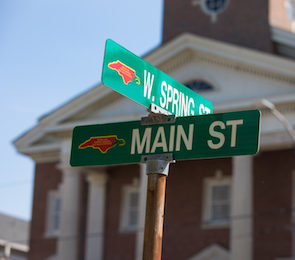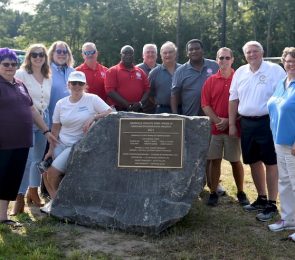Posted September 15, 2022
Granville County was selected as one of the twenty-three host sites statewide for the Lead for North Carolina (LFNC) program, part of the University of North Carolina at Chapel Hill School of Government. Granville County began hosting a recent college graduate for a one-year fellowship in August. Keegan Rapp, a graduate of Queens University of Charlotte hailing from Belmont, North Carolina, has been placed with Granville County for his fellowship year.
“I became a Fellow to learn more about how local government assists people in North Carolina,” Rapp said. “I will work to boost the capacity of Granville County while elevating the county and learning its story. I am excited to be in Granville County and to integrate within this community.”
LFNC serves as a bridge between North Carolina communities and smart, passionate, and committed young leaders. With the launch of its fourth cohort this year, the program has placed 74 fellows in positions with municipal governments, county governments, and regional councils across North Carolina. By recruiting, training, and placing these fellows, LFNC seeks to strengthen public institutions, support local communities, and cultivate a new generation of public service leaders.
“We are excited to host Keegan Rapp as our Lead for NC Fellow,” said Assistant County Manager Korena Weichel. “Keegan will assist and learn from all county departments during his time with us. Granville County Government is committed to cultivating the next generation of local government leaders as prioritized by our Board of Commissioners in the 2021-2025 strategic plan. Hosting a Lead for NC Fellow is a great way to gain valuable assistance for county management while also providing Keegan with an in-depth training ground to begin his public service career.”
The twenty-three fellowship placements span levels of local government: ten will serve in municipalities, eight in county offices, and six in regional councils of government. In total, fellows’ assignments will cover thirty-seven individual North Carolina counties. Fellows will work in areas including budgeting, management, opioid response, planning, housing, and economic development.
Lead for North Carolina is made possible through funding from an array of partners, including the State Employees’ Credit Union Foundation, AmeriCorps, The Anonymous Trust, Golden LEAF Foundation, The Jessie Ball duPont Fund, the North Carolina League of Municipalities, State Farm, Wells Fargo, and the Z. Smith Reynolds Foundation.
Lead for North Carolina is joined by the following founding partners: the North Carolina League of Municipalities, the North Carolina Association of County Commissioners, the North Carolina City/County Management Association, and Lead for America.




